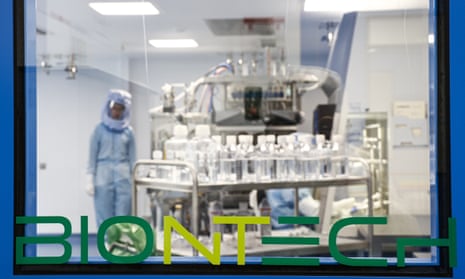Trials of personalised cancer vaccines in England are to be speeded up after a government deal with a firm behind one of the major Covid jabs.
The UK health secretary, Steve Barclay, is to sign a memorandum of understanding with BioNTech on Friday to “ensure the best possible treatments are available as soon as possible” for cancer.
The agreement means cancer patients in England will get early access to trials exploring mRNA therapies, such as cancer vaccines, possibly from as early as autumn.
MRNA treatments are tailor-made for the individual and provide immune systems with genetic code from the specific cancer so it can attack only the tumour, whereas chemotherapy targets lots of different cells as well as the cancer.
BioNTech worked with Pfizer to develop the widely used mRNA vaccination against Covid, and its partnership with the UK government could deliver 10,000 doses of personalised therapies to UK patients by 2030 through a new research and development hub.
Barclay said: “Once cancer is detected, we need to ensure the best possible treatments are available as soon as possible, including for breast, lung and pancreatic cancer.
“BioNTech helped lead the world on a Covid-19 vaccine and they share our commitment to scientific advancement, innovation and cutting-edge scientific technology, making them perfect partners for a deal to work together on cancer vaccines.”
He added: “This partnership will mean that, from as early as September, our patients will be among the first to participate in trials and tests to provide targeted, personalised and precision treatments using transformative new therapies to both treat the existing cancer and help stop it returning.”
Prof Uğur Şahin, the chief executive and co-founder of BioNTech, said: “The UK successfully delivered Covid-19 vaccines so quickly because the National Health Service, academia, the regulator and the private sector worked together in an exemplary way.
“This agreement is a result of the lessons learned from the Covid-19 pandemic. Drug development can be accelerated without cutting corners if everyone works seamlessly together towards the same goal. Today’s agreement shows we are committed to do the same for cancer patients.”
after newsletter promotion
Şahin added: “Our goal is to accelerate the development of immunotherapies and vaccines using technologies we have been researching for over 20 years. The collaboration will cover various cancer types and infectious diseases affecting collectively hundreds of millions of people worldwide.
“If successful, this collaboration has the potential to improve outcomes for patients and provide early access to our suite of cancer immunotherapies as well as to innovative vaccines against infectious diseases – in the UK and worldwide.”









